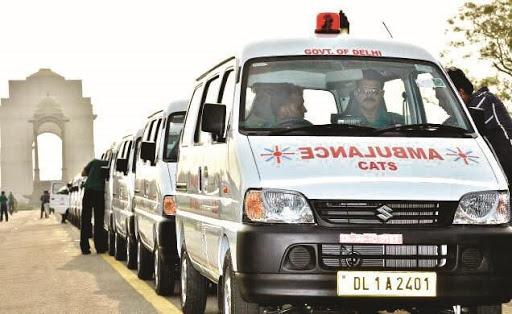Delhi’s COVID-19 Fight Hits a Snag Due to Outsourced Ambulance Service

Representational image. | Image Courtesy: Millenium Post
A decision taken by the Aam Aadmi Party–led Delhi government to outsource the operation of ambulances in the national capital four years ago is proving to aggravate difficulties of patients amid the coronavirus crisis, who are being subjected to harrowing experiences before availing the emergency service.
The burdened service has been marked with poor maintenance and excruciating wait hours, alleged health volunteers. As a result, objectives of outsourcing the service to a private company remain utterly unfulfilled, unfortunately at a time when it is needed the most, they said.
Inevitably, it also handicaps the Delhi government, as it battles against the continuing surge in cases of COVID-19 in the national capital.
Even after months of imposing restrictions over private vehicles owing to virus-induced lockdown, “it is still not easy to avail an ambulance service,” said Inayat Singh Kakkar, a health volunteer with Jan Swasthya Abhiyan, a nationwide network of doctors and health experts. She, along with other volunteers, has been extending help to patients in Delhi during medical emergencies.
“In most of the cases, it first takes one to two hours even to connect to the ‘102’ helpline and then we are told that the ambulance will take another 40 minutes to reach,” she said. ‘102’ is the toll free helpline number of Centralised Accident and Trauma Services (CATS), the government body which provides 24*7 free ambulance services.
The sluggish response time of an emergency medical service presents a “dilemma”, according to Kakkar, about whether to wait for the ambulance and in her experience, they have always been forced to look for other means of transport.
For example, Kakkar referred to a case in one of the containment zones in Delhi where a pregnant woman was required to reach hospital urgently. “We called ‘102’. We were told that the ambulance is coming. But it never came. Hours later, we eventually had to arrange some other conveyance,” she said.
Such delays in emergency situations could cost the patient their life, she added.
On May 10, Delhi Chief Minister Arvind Kejriwal took note of the crumbling ambulance services in the national capital; however, counted upon ambulances of private hospitals by ordering for their requisition without shedding light on the reasons behind such sorry state of affairs.
Much of the later has to do with outsourcing of the service, first happening in 2016. The ambulances in Delhi are currently being operated and maintained by a private company, namely, GVK EMRI, which entered into an agreement with CATS in June 2019.
“The service started to deteriorate from 2016 only,” said Narendra Lakra, President of CATS Staff Union, “the ambulances were not maintained properly leading to decrease in the fleet size.” The response time which was around 20 minutes, as a result over the years post outsourcing increased to over an hour, he added.
In addition to the deteriorating services, the outsourcing of the ambulances also affected labour standards, which in times of coronavirus translates to poor safety of the workers – drivers and paramedics – who are among the front line health workers, labouring for twelve hours in a single shift.
Lakra alleged that over 350 workers under GMK EMRI have refused to drive ambulances owing to lack of personal protection equipment (PPE) and sanitisers in the ambulances. They fear that they will be infected with the virus, he said.
This claim, however, has been denied by GVK EMRI’s state head Manish Tinku. According to him, the company has provided “more than enough” PPE kits to its workers.
When asked about the allegations over non-maintenance of ambulances, he said, “Out of 200 ambulances under us, 180 are active as of today [May 13]. There are 50 ambulances that are dedicated for coronavirus patients. Our response time has been around 21 to 22 minutes.”
Contrary to this, sources told NewsClick that according to an internal report prepared for May 13, only 83 ambulances were “call worthy” – meaning active – out of 300 total CATS ambulances, which included additional ambulances that were acquired from neighbouring state Uttar Pradesh. A day earlier, on May 12, the number of active ambulances were 95, only slightly better.
According to an order dated March 25, all the health care facility workers who are directly involved in treatment of COVID-19 patients, must get tested for the viral infection themselves. GVK EMRI’s Tinku informed NewsClick that out of a total manpower strength – which numbers around 700 to 800 – as many as 300 were asked to get tested, out of whom one ambulance staff member has been tested positive.
However, employees who spoke to NewsClick on condition of anonymity said that many who have shown symptoms of the virus are yet to get their tests done. “They are afraid that if tested positive, the company would ask them to sit at home in which case their salaries might get cut,” said an employee.
“There is no concern shown by the company over whether employees have been tested or not. We have also not heard any proper communication about our pending salaries,” said another employee who hasn’t received his salary for the month of April yet.
This wouldn’t have been the condition of the ambulances in Delhi, had it not been outsourced to a private company, Lakra told NewsClick. Kakkar also believed that it is difficult to demand accountability from the private sector in cases of negligence.
NewsClick also tried reaching the administrative officer (operation) of CATS. When contacted first, the officer said he was in a meeting and asked to call some other time. Calls made later, however, went answered.
Also read: COVID-19 in Rural India-XXXV: How Assam’s Atugaon Is Coping With Lockdown
Get the latest reports & analysis with people's perspective on Protests, movements & deep analytical videos, discussions of the current affairs in your Telegram app. Subscribe to NewsClick's Telegram channel & get Real-Time updates on stories, as they get published on our website.
























